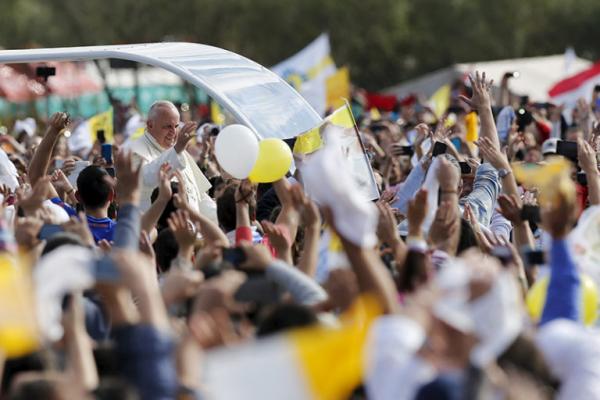Last month, just before the election, I joined a delegation of grassroots and popular movement leaders, organizers, and Catholic Church officials from the United States in Rome for the third World Meeting of Popular Movements.
Entering the Christian season of Advent — a time of spiritual preparation before Christmas in search of hope and peace — my thoughts travel back to that time, in Rome alongside 200 others from more than 60 countries.
The convening was the third in a series of remarkable encounters (Rome 2014, Bolivia 2015, Rome 2016) between the pope and grassroots leaders, organizing to transform systems that fail to provide the basic human rights of land, work, and housing for those “on the peripheries” of society — whether they live in Africa, Latin America, Asia, Oceania, or North America.
If I’ve learned anything since my time in Rome, it’s that people — not just Catholics — are hungering to connect peace with justice. This is why those of us who traveled to Rome just before the election, accompanied by Stockton, Calif., Bishop Stephen Blaire, and Houma-Thibodaux, La., Bishop Shelton Fabre, are preparing for a regional WMPM meeting in Modesto, Calif., in February.
In his address at the second World Meeting of Popular Movements, in Bolivia, the pope said, “The future of humanity does not lie solely in the hands of great leaders, the great powers, and the elites. It is fundamentally in the hands of peoples, and in their ability to organize.”
Throughout the series of world meetings, Francis has made it a point to accompany these grassroots organizers on their journey: to learn from them, to encourage them, and to lend his moral authority to their cause. He has called them “social poets,” recognizing the ways in which they reimagine and reorganize their world, to promote greater justice and human dignity for those who have been shut out, or discarded by an economy that, in the pope’s words, excludes and kills.
Since his installation, Francis has called not only for fundamental structural changes in the economy and society, but for people to organize from below to create change. On the heels of a bitterly contested presidential race here in the U.S., our call to create spaces of radical empathy, where we acknowledge and take up the plight of the marginalized and the oppressed, is more important than ever.
The pope’s fierce denunciation of low wages, racism, and the exploitation of immigrants and the poor is an expression of a long history of Catholic social teaching and tradition. His call for the poor and marginalized to be seen, and heard, is reflected in 50 years of support by the U.S. Conference of Catholic Bishops, for community organizing led by those who are closest to the pain of injustice. The Modesto gathering in February is a manifestation of that call.
By fostering dialogue between church leaders, and both faith-based and secular organizing groups, we hope to promote deeper solidarity in the shared pursuit of justice and peace. The mid-February meeting will take place within the first month of the new administration, presenting a timely opportunity to present a vision for America where everyone is seen, everyone is valued, and the rights of all are respected.
This is a kairos moment — a God-timed moment of action — for the Catholic Church in America and our broader society, as the pope reminds us, in this season of preparation, to “enlarge the horizons of our hearts, to be surprised by the life that is presented each day with its newness.”
As our time in Modesto approaches, we are heeding the pope’s call to organize, preparing our hearts and minds, so that we might improve conditions for all working families, and strengthen the structural dimension of charity and justice.
Got something to say about what you're reading? We value your feedback!
